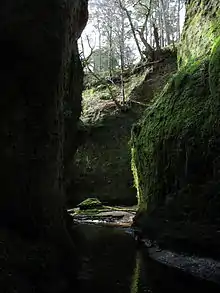Finnich Glen
.JPG.webp)
Finnich Glen in Stirlingshire, is a short, steep glen up to 70 ft deep which runs east from Finnich Bridge on the A809. It was carved from the red sandstone by the Carnock Burn.
It features a circular rock known as the Devil's Pulpit[1][2] and a steep staircase known as the Devil's Steps, built around 1860.

Following its use to depict the fictional St Ninian's Spring in the time-traveling romance TV series Outlander in 2014, the site has seen an explosion in tourism, with an estimated 70,000 visitors now coming to the site each year.[3] This has caused stress on both the location itself, and to tourists and local officials, as visitors have trampled fences to access the site and then scrambled down the crumbing, broken 200-year-old stone steps used to access the bed of the gorge, damaging the site and on numerous occasions requiring mountain rescue teams to be dispatched to the gorge for rescues.[3] There being no parking facilities, the large influx of tourists have additionally left large numbers of vehicles parked along the side of the adjacent narrow rural road, blocking access for local residents and first responders.[3] Under a £2 million development plan, landowner David Young has proposed to develop the site as a tourist attraction, including a visitor centre and restaurant, toilets, a 150-spot parking lot, formal "footpaths, viewing platforms and bridges above the gorge, and a new wood-and-metal staircase".[3] The plan requires approval from the local council.[3]
References
- "Devil's Pulpit".
- "How to Find the Devil's Pulpit in Finnich Glen, Scotland". 25 September 2017.
- Baynes, Richard (30 September 2019). "£2m plans drawn up for dangerous Outlander beauty spot". The National. Retrieved 16 February 2020.
- Carr, Flora (12 April 2020). "Where is The Nest filmed? Location guide for BBC One drama". Radio Times. Retrieved 22 April 2020.